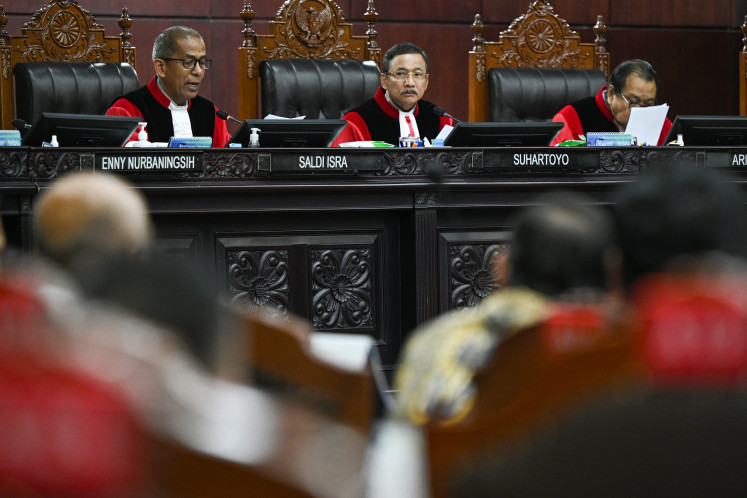Popular Reads
Top Results
Can't find what you're looking for?
View all search resultsPopular Reads
Top Results
Can't find what you're looking for?
View all search resultsThe price of complacency
When Foreign Policy magazine released its annual Failed States Index 2009 and categorized Indonesia as a nation "in-danger", a subsequent opinion piece on the matter published in The Jakarta Post on July 9 (by Alexandra Wulan) was met with objections from numerous online readers
Change text size
Gift Premium Articles
to Anyone
W
hen Foreign Policy magazine released its annual Failed States Index 2009 and categorized Indonesia as a nation "in-danger", a subsequent opinion piece on the matter published in The Jakarta Post on July 9 (by Alexandra Wulan) was met with objections from numerous online readers. "In-danger, how absurd", one wrote, and "Indonesia feels like the most peaceful country in the world".
Naming Indonesia as "in-danger" may seem an overstretch. There are certainly many things that make Indonesians feel proud to be citizens of this democratic republic.
Indonesia just successfully conducted its second direct presidential election. Despite logistical gaffes from the General Elections Commission (KPU), in general the public was satisfied, confirming the legitimacy of the results.
On the economic front, Indonesia manages to enjoy stable economic growth, despite the contemporary global financial crisis affecting other regional countries. GDP grew by 4.4 percent (year-on-year) in the first quarter of 2009, outstripping both Malaysia and Singapore, whose economies contracted by 6.2 percent and 9.6 percent respectively.
More importantly, in terms of security the country had barely seen any terrorist incidents since the Bali bombings in 2005. A suicide bomb attack against two major hotels in Jakarta was probably the last thing anyone expected to happen - out of sight and out of mind.
The blasts that killed 9 people in South Jakarta on Friday, July 17, reminded us that terrorist incidents are not a thing of the past.
The suspects' modus operandi - planting suicide bombers and using familiar types of explosives - serves as a harsh reminder that Islamic terrorist groups still have no difficultty recruiting willing individuals to participate in inhumane acts. Indonesia remains a home to militant terrorists.
From an economic point of view, the bombings left the market virtually unscathed. The Jakarta Stock Exchange Composite Index and the IDR-to-US Dollar exchange rate, two indicators that mirror instant market reactions to economic and political instability, remained relatively flat.
Stronger macroeconomic fundamentals certainly played a role in minimizing the effects of the incidents. Government officials and market players seem fairly optimistic that the event will not have any significant impact on the economy, though tourism is naturally expected to suffer a blow.
Yet the real cost of the incident lies in the broader policy questions it raises. Despite numerous praises offered by the international community, Indonesia still faces a host of economic challenges.
True, in the past five years, Indonesia has managed to stabilize its macroeconomic fundamentals. GDP has grown at an average annualized rate of 5.7 percent.
Nevertheless, macroeconomic stability still has not translated into more significant real sector activities, which in turn absorb unemployment and reduce poverty. Unemployment is still at a mildly-concerning 8.1 percent. The export sector, an important source of growth, will remain modest so long as global demand is weak. On top of that, there are a number of structural issues that have not yet been adequately resolved.
Regulatory weaknesses, bureaucratic inefficiency and the high cost of doing business still reflect poorly on Indonesia's overall competitiveness. Infrastructure development, a key ingredient to improving competitiveness and supporting industrial activity, is still weak. Given the government's budget constraints and the non-supportive external environment, the prospects of achieving significant near-term resolutions to these problems are quite poor.
From a political point of view, the latest incident is a test of the government's continued efforts to effectively combat terrorism. It is imperative to critically review loopholes in our intelligence and security that allowed the event to happen in the first place. Continued cooperation from other neighboring countries is also crucial, given the transnational nature of the incident, with the infamous Malaysian Noordin M. Top the prime suspect.
Indonesia has undoubtedly come a long way on the road to democratization and economic reform since it reached its nadir point in 1998. It is only natural to feel complacent about these achievements.
However, one cannot afford to be. One of the main goals of terrorism is to deliver a psychological blow to a given society. The fact that the attack coincided with the completion of a peaceful election clearly indicates the terrorists intended to reduce the credibility of the government and democracy as a whole.
The intent was, once again, to make suicide bombs the first thing that comes to mind when the global community thinks about Indonesia.
Thus, the government has a fairly straightforward list of things it needs to do. It needs to continue directing efforts toward tackling the political consequences of the incident. In order for the government to retain credibility, it must demonstrate both goodwill and a serious commitment to combating terrorism. Secondly, it goes without saying that the government must seriously continue pursuing economic reform.
Terrorists, like all perpetrators of crime, lurk behind regulatory and supervisory weaknesses. When your nation becomes the repeated target of suicide bombings, the only motto that one can afford to embrace is constant vigilance. There is absolutely no room for complacency.










